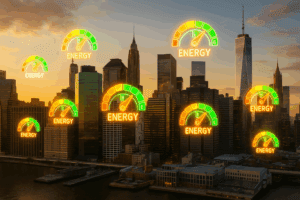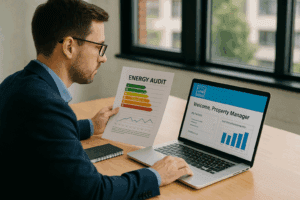I. Introduction
The adoption of commercial solar panels has seen a remarkable surge in recent years, with businesses increasingly turning to solar energy as a cost-effective, sustainable, and eco-friendly solution to meet their electricity needs. This transition represents more than just a shift in energy sources; it symbolizes a substantial commitment to harness the power of the sun for financial gain and ecological benefit.
II. The Basics of Commercial Solar Panels
Commercial solar panels, commonly known as photovoltaic (PV) panels, are intricate systems designed to capture sunlight and convert it into usable electricity. These systems comprise several essential components:
- Photovoltaic Cells: These cells are the core of the solar panel system. Constructed from semiconductor materials, primarily silicon, they absorb photons from sunlight, generating a flow of electrons that results in direct current (DC) electricity.
- Inverter: The DC electricity produced by the photovoltaic cells is not compatible with most commercial devices and facilities. The inverter plays a pivotal role by converting the DC electricity into alternating current (AC), the type of electricity used in most applications.
- Mounting System: Solar panels are securely installed on mounting structures, which can be roof-mounted or ground-mounted. These systems ensure that the solar panels are appropriately positioned to maximize sun exposure.
The benefits of commercial solar panels extend far beyond electricity generation. Let’s explore the key advantages that make them an appealing choice for businesses:
A. Cost Savings
One of the primary drivers behind the adoption of commercial solar panels is the potential for significant cost savings. By producing electricity on-site, businesses can significantly reduce their reliance on expensive grid power. As a result, monthly electricity bills decrease, and surplus electricity can often be sold back to the grid for additional revenue.
B. Environmental Impact
Apart from the financial advantages, the environmental impact of commercial solar panels is substantial. Solar energy is a clean and sustainable power source that markedly reduces a business’s carbon footprint. By generating clean energy from sunlight, businesses make a tangible contribution to reducing greenhouse gas emissions, mitigating the harmful effects of climate change.
C. Energy Independence
The quest for energy independence is a significant motivator for many businesses exploring commercial solar panels. By generating their own electricity, businesses reduce their reliance on external power providers and the grid. This independence can be especially critical during grid outages or disruptions. With the right setup, businesses can continue operations even when the grid is down, ensuring business continuity and peace of mind.
III. Calculating ROI for Commercial Solar Panels

While the advantages of commercial solar panels are evident, the financial investment required for installation is not insignificant. Therefore, it’s vital to grasp the concept of Return on Investment (ROI) to determine how quickly your solar panel investment will pay off and begin generating significant savings.
Several factors influence the ROI of your commercial solar panel system:
A. Initial Installation Costs
The upfront cost of purchasing and installing solar panels can vary widely depending on the size and complexity of the system. However, it’s essential to consider this as an investment rather than an expense. While the initial cost can be substantial, the long-term benefits make it a wise choice.
B. Energy Production and Savings
The amount of energy your system generates and the resulting savings on your electricity bills are critical determinants of ROI. Solar panels produce electricity whenever the sun is shining, and any excess can be fed back into the grid or stored for later use. The greater your energy consumption, the more you stand to save by producing your electricity.
C. Government Incentives and Tax Credits
Governments at various levels often offer incentives and tax credits to promote the adoption of solar energy. These financial benefits can significantly impact your ROI. Investigate the incentives available in your area and leverage them to maximize your ROI.
D. Maintenance and Operational Costs
Solar panels are relatively low maintenance, but they do require some care and attention. Regular inspections, cleaning, and addressing minor issues promptly are essential to ensure the system operates at peak efficiency. These maintenance costs should be factored into your ROI calculations.
E. Projected Lifespan of Solar Panels
Most commercial solar panels are designed to last for at least 25 years or more. When calculating ROI, consider the extended lifespan of the panels and how this impacts your overall savings. Over time, your ROI will continue to grow.
To calculate ROI, you can use the following formula:
**ROI = (NET PROFIT / TOTAL INVESTMENT) X 100%**
The ‘Net Profit’ accounts for your energy savings, incentives, and other financial benefits, while the ‘Total Investment’ includes all installation and maintenance costs.
An accurate ROI assessment is crucial. By carefully analyzing these factors and consulting with solar energy experts, you can make well-informed decisions that lead to a highly favorable ROI.
IV. Maximizing ROI: Strategies for Success

Achieving the maximum ROI from your commercial solar panel system is not just about investing in the technology; it’s about optimizing its performance and aligning it with your business’s unique needs. Here are several strategies for success:
A. Choosing the Right Solar Panel System
Selecting the appropriate type of solar panels for your business is essential. Consider factors such as the efficiency, durability, and warranty of the panels. Additionally, ensure that the system size matches your energy needs, and invest in high-quality components to guarantee the longevity and efficiency of your solar panel system.
B. Location and Solar Panel Orientation
The location of your solar panels is a crucial determinant of their performance. They should be positioned to receive maximum sun exposure throughout the day. The optimal tilt and orientation for your specific latitude should be considered to maximize energy generation. Roof-mounted and ground-mounted systems have different considerations, so choose the option that suits your business best.
C. Energy Efficiency Measures
Enhance your solar panel system’s effectiveness by implementing energy-efficient practices within your business. By reducing energy consumption, you not only save more but also extend the life of your solar panels. Upgrading energy-efficient appliances and equipment is a worthwhile investment.
Additionally, consider implementing smart building design and automation systems. These technologies can help regulate energy usage and reduce waste, making your business more energy efficient.
D. Maintenance and Monitoring
Regular maintenance and monitoring of your solar panel system are essential to ensure it continues to operate at peak efficiency. This includes periodic inspections, cleaning, and addressing any issues promptly. Investing in performance monitoring and data analysis can help you identify potential problems before they impact your energy production.
Solar panel monitoring systems provide real-time data on energy production, enabling you to track your system’s performance and identify any anomalies. Early detection of issues allows for timely maintenance and ensures that your system consistently generates electricity at its maximum capacity.
V. Potential Challenges and How to Mitigate Them
While commercial solar panels offer numerous advantages, they come with their set of challenges that businesses should be prepared to address. Here are some common challenges and strategies to mitigate them:
A. Intermittent Power Generation
One of the main challenges of solar energy is intermittent power generation. Solar panels rely on sunlight to produce electricity, and their output can fluctuate with weather conditions and time of day. To mitigate this challenge, energy storage solutions, such as batteries, can be integrated into your solar panel system. These storage systems allow you to store excess electricity when your panels are producing more than your business needs and use it when the sun isn’t shining, ensuring a continuous power supply.
B. Initial Investment Challenges
The upfront cost of installing a commercial solar panel system can be a barrier for some businesses. However, numerous financial strategies can help mitigate this challenge. As mentioned earlier, you can choose to purchase, lease, or finance your system. Leasing and financing options can reduce the initial financial burden, making solar energy more accessible to businesses with budget constraints. Additionally, government incentives and tax credits can significantly offset the installation cost, making the ROI more attractive.
C. Regulatory and Permitting Issues
Navigating local regulations and obtaining the necessary permits for solar panel installation can be a complex and time-consuming process. To mitigate these challenges, it’s advisable to work with professionals who specialize in solar energy and have experience with the permitting process in your area. They can help you navigate the legal requirements, obtain the necessary permits, and ensure your installation is compliant with local regulations.
VII. Conclusion
In summary, investing in commercial solar panels is a strategic move for businesses seeking cost savings, energy efficiency, and sustainability. Understanding ROI and implementing these strategies is key. The benefits go beyond finances, encompassing environmental responsibility and a brighter future. Tailor your approach to your business, collaborate with solar experts, and contribute to a cleaner, sustainable world.
Discover how VertPro.com can elevate your property’s energy efficiency to new heights. We are your ultimate destination for all things related to Commercial Energy Audits, Benchmark Compliance consultancy, and access to our state-of-the-art Construction Marketplace. As trailblazers in the industry, VertPro® empowers Building Owners and Property Managers across the nation with innovative SaaS technology-based solutions. From Energy Benchmarking to Energy Audits/RCx Plus, we’re dedicated to ensuring compliance with over 50 Energy Benchmarking and Energy Efficiency Laws.
Now is the time to seize the opportunity to maximize your property’s energy potential and value. Explore VertPro.com’s comprehensive solutions today and let us be the catalyst for the transformation your property deserves. Your energy-efficient future starts here!















